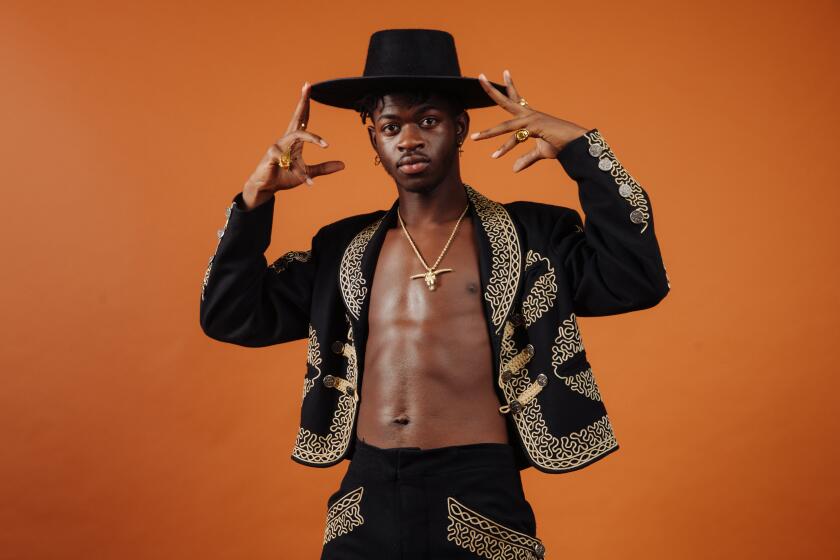Academy in a funk
- Share via
WHAT does it say about the credibility of the Grammys when the artist who made the biggest splash at Wednesday’s ceremony never won a Grammy during his two-decade recording career? Sly Stone never even got nominated.
Not for “Dance to the Music,” the groundbreaking 1968 single that stands as a bridge between the pure sensual assault of James Brown and the liberating imagination of Prince. Not even for “Everyday People,” the 1969 brotherhood anthem that also merged pop, rock, R&B; and funk.
For the record:
12:00 a.m. Feb. 10, 2006 For The Record
Los Angeles Times Friday February 10, 2006 Home Edition Main News Part A Page 2 National Desk 1 inches; 44 words Type of Material: Correction
Grammy notebook -- The critic’s notebook on the Grammy Awards in Thursday’s Calendar said that Sly Stone never won a Grammy and was never nominated. Stone was nominated but did not win in 1973 in the R&B; song category for his hit “Family Affair.”
Whatever the answer, it’s not good -- and there’s not much else you can say about the Grammy choices this time around. For the second year in a row, the Recording Academy failed to give either of its top awards, album or record of the year, to Kanye West, an artist who is a revolutionary force today in the tradition of Sly Stone.
In his first two albums, West has liberated hip-hop by replacing thug-life cliches with compelling human portraits. He has broadened hip-hop’s musical boundaries by infusing elements of pop and soul into it.
Though the loss of West’s “Late Registration” in the album of the year category was somewhat cushioned by the fact that another great album, U2’s “How to Dismantle an Atomic Bomb” won, the upset in record of the year, going to Green Day’s over-baked “Boulevard of Broken Dreams” instead of West’s supercharged “Gold Digger,” was another sign of Grammy voters’ timidity.
After more than 35 years of Grammy commentaries, I have no more faith in the academy’s judgment than when I started. Despite occasionally inspired choices, it still feels almost like a fluke when the right nominee wins.
The idealist in me has tried hard over the years to believe that putting a spotlight on the best artists actually helped elevate the quality of pop music by inspiring audiences and musicians to better things.
But history has shown that few things happen quite that neatly. After honoring a great artist, academy voters have often returned the next year to salute a mediocre one.
In the Grammy ceremonies, we’ve watched aghast as voters awarded record of the year to something as slight as Olivia Newton-John’s “I Honestly Love You” in the same year it honored such spectacular works as Stevie Wonder’s “Fulfillingness’ First Finale” as album of the year.
In the ‘90s, the decade of hip-hop and grunge, awards went to Natalie Cole, Tony Bennett and Celine Dion.
The problem is the academy’s 13,000 voting members have widely varying tastes and levels of conscientiousness when it comes to checking out new music. They are slow to pick up on edgy, challenging developments. They resisted rock ‘n’ roll for years and still seem to feel uneasy about rap, hence snubbing Eminem and West in the top categories repeatedly in recent years. (Miraculously, OutKast sneaked through for best album two years ago.)
In fact, the whole voting process seems to have so little reliability year after year that it’s like watching the results of a spin of a roulette wheel.
So why do we tune in each year?
Partly, it’s to root for our favorites, a bit more sophisticated form of “American Idol” (which, coincidentally, crashed the Grammy party with Kelly Clarkson’s two victories).
But we so hope a piece of magic happens during the live performances -- notably U2’s touching duet with Mary J. Blige on “One.”
There also were moments in the awards that deserved praise, including West’s win in best rap album, John Legend’s in R&B; album and new artist, the White Stripes in alternative music and U2 in rock album and best song.
Yet other awards were disheartening -- Kelly Clarkson’s victory over the far more deserving Fiona Apple in pop vocal album and Gretchen Wilson’s loss to Alison Krauss in best country album.
Critically, West’s “Late Registration” went into the evening as the heavy favorite. In a Village Voice poll of 795 pop critics, it finished No. 1 by a wide margin over any of the other album nominees. U2’s “Dismantle” is the only other contender to make Voice’s top 10. It finished No. 8 in last year’s poll. (The album came out too late in 2004 to be in Grammy contention last year.)
The other best album nominees finished far back this year: Mariah Carey, No. 54 and Paul McCartney, No. 73. Gwen Stefani didn’t make the top 200.
If there was any doubt that this was West’s year, his live performance was a highlight of the night, a razzle-dazzle performance of “Gold Digger” and “Touch the Sky” that captured the zany, anything goes, cross-cultural imagination of Sly Stone in his prime.
Still, the voters turned elsewhere in the two top categories.
By doing so, they let us down. It’s hard to criticize someone for giving U2 its top honor. But the Irish band has now won 22 times. This should have been Kanye West’s night.
Backstage after the show, West tipped his hat to U2, then said: “I understand the politics of it. I thought first thing, ‘Let’s go back to the studio ... and show them I really deserve album of the year.’ ”
More to Read
The biggest entertainment stories
Get our big stories about Hollywood, film, television, music, arts, culture and more right in your inbox as soon as they publish.
You may occasionally receive promotional content from the Los Angeles Times.










